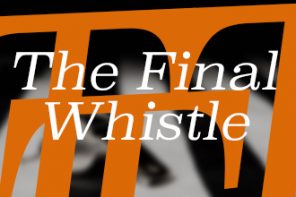The problem with nicknames is that you cannot choose you own. Not that you would ever trust anyone who did. Something pivotal will happen, the nickname will arrive and then it will stay with you forever. For Liverpool legend David Fairclough, that something was St Etienne in 1977 and a crucial solo goal in the last moments that set Bob Paisley’s side on their way to Rome and their first European Cup success. That nickname, bestowed to him already, but cemented in the national consciousness by commentator Gerald Sinstadt, was ‘Supersub’.
Fairclough was the original supersub, the proto-Solskjaer, if you will. It rankled with him then and it rankles with him now, even if he’s reached an uneasy peace with the tag now, recognising the part he’s played in so many people’s memories.
“The fact that it is such a big memory for other people is fantastic,” he says. “The amount of people I bump into who have told me that they were there that night or that it was their first football match, or that they can remember listening to it on the radio under the covers.”
But for all the magical moments, Fairclough still wishes that he could have played a bigger part in Liverpool’s success, that he could have been a regular first team choice, rather than the option from the bench. In his book, he recalls a moment long after his retirement when former coach Roy Evans challenged his view of those days, telling him to consider the fact that his ability to make an instant impact was the reason he was so cherished and that, in a way, his place on the bench wasn’t a rejection, but a recognition of his talents. Unsurprisingly, Fairclough remains unconvinced.
“Roy’s a close mate and he got me through my difficult times at Liverpool,” he says. “His philosophy and his attitude around the Central League reserve team was great, he brought a nice vibe to the team and it made it fun. The fact that he came out with that, well, it makes me wish he’d said it years ago, rather than after we finished. It was an interesting comment. I don’t necessarily think he’s right, but on the odd occasion it might’ve been the case.
Fairclough believes that it wasn’t simply his pace and dynamism that saw him start on the bench so often, it was his versatility. In the 1970s, only one substitute was allowed, so it made sense to have one who could play across a variety of roles.
“I really was comfortable anywhere,” he says. “I was a victim of my own versatility. I’m not naturally right footed, but I could kick well with my right foot, so I was never restricted. Maybe this was a big part of the Sterling issue too, when he was at Liverpool. He wasn’t playing anywhere for long enough, he was pushed here, there and everywhere to fill a hole. When you get moved around a lot, you lose your identity. I thought it was quite brave of Sterling to say, ‘I want to play on the left side,’ like he plays for England and as he does for Manchester City now. You want a position.”
Fairclough did consider a Sterling-like response to his woes, but these were very different times. There was no Bosman rule, there were few agents and the power was very firmly in the hands of the clubs.
“Oh, I often spoke to Paisley about leaving,” he says. “When my dad died in 1977, he said, ‘You’re always going to get the dirty end of the stick at Liverpool.’ If my dad lived, my future could’ve been completely different. When he was around, he knew that I wasn’t getting the fair crack of the whip. He would’ve helped me around that time, but I did go and see Paisley on a number of occasions. I said, ‘I want to leave,’ and he just told me, ‘You’re going nowhere.’ I think at the time that Anderlecht were coming in for me, but he just said ‘You’re not going anywhere.’ It wasn’t easy then. In this day and age, people are able to dictate their terms.”
Born within earshot of Anfield, Fairclough was the archetypal local boy made good, pushing his way into the first team while his contemporaries fell frustratingly short. He could not have asked for a better education than training sessions with some of the biggest names in football at the time.
“When I came into the club, a local boy, they were my heroes. People like Roger Hunt and Ian St John, Chris Lawler and Tommy Smith. I’m there breaking into the reserve team and sometimes they would be in the reserves too. Being around people like that, I don’t know if I ever felt daunted, but it definitely kept me on my toes. I look at football now and I hear the young footballers talking about having a good year in the U16s before moving up to the U18s. I came into Liverpool and I never thought about having a period in one team then moving up to another. I just wanted to prove myself as quickly as I could, and get into the first team. You go in there and you stand on your own two feet from day one. You come in as the best player in your school team, or your Sunday League team, or wherever you’ve come from and all of a sudden you go into Liverpool. You’ve got to start from the beginning again, no matter how great you think you are, or what your capabilities are, you’ve suddenly got a lot of people who are on your back about being the new kid. You don’t know how to do this, you don’t know how to do that. It is tough, but that’s when you say, ‘I’m going to show you what kind of player I am. I’m faster than anybody else. I’m not scared of reputations.’
Nowadays, young players stay within the academy until, at Liverpool at least, the very best are invited to train with the senior players. This is not a policy that Fairclough supports.
“Young players are kept away from the big stars for too long. We were on the bus with Tommy Smith, Kevin Keegan, Emlyn Hughes, absolutely amazing people to be around. That does something to you when you’re 15 or 16, that sink or swim attitude. You either get noticed or you fade away in the background. Sometimes you’d get invited to play in the six a side team with the senior players, when the coaches decided to throw a young kid in there. Let me tell you, if they didn’t get the ball to their feet the way that they wanted, they’d quickly put you in your place. That was an absolutely massive education.
Youth policy isn’t the only aspect of English football of which Fairclough is unimpressed.
“People have developed a science around football now. You can go back to the old days, pick whatever manager you like, you know, Shankly, Busby, all of them would have said the same thing; it’s a simple game made difficult. There’s too much thought surrounding it. What made Liverpool so successful is that we didn’t care about who we played against. Nowadays, you see the likes of Jose Mourinho and they’re constantly planning these strategic tactics and stuff. I can’t remember a single team talk at Liverpool. I can’t remember a half time dressing down. At Liverpool, you were given responsibility, you were in there because you were capable of doing something. I just can’t work out why all of a sudden it’s become this overhyped, tactical thing. When you see substitutes coming on at the side of the pitch and they’re being given all these instructions from a folder, I think, is it all really necessary?”
“Paisley’s instructions would be something like, “Go on there and cause a bit of trouble,” or, “Just see if you can get a bit of something,” or, “ Make a name for yourself!” something very simple like that. One of the strongest pieces of instruction I was given was in my last European game for Liverpool and he told me definitively, “Just stay out here on the right hand side and get crosses in.” Looking back on it now, that was probably the most direct instruction I’ve ever been given. I went out there, I stayed on the right side, I got a couple of crosses in, we scored a couple of goals from them. It was so simple. I look at football now and I think it’s not the game I grew up loving to play.”
David Fairclough’s autobiography ‘Supersub’ is out now. You can read a review of it here.






